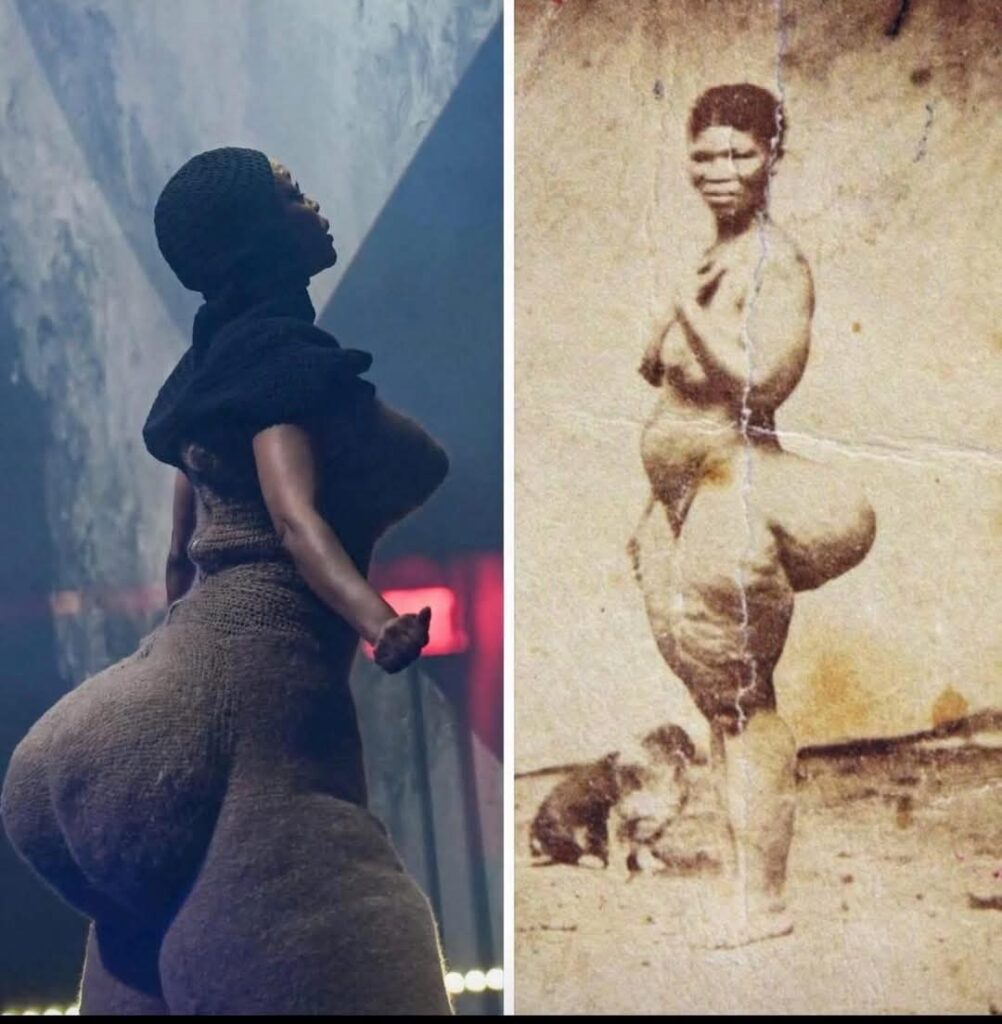Title: Sarah Baartman, born Saartjie Baartman, was the first Black woman publicly ridiculed for her natural body. She was put in cages for entertainment, violated, and dehumanized until she died from syphilis. Her story is painful but must be remembered.
Erykah Badu’s message is deeper than what some may think, it’s art, history, and truth. We are what they fear.

The story of Sarah Baartman, born Saartjie Baartman, is one of deep pain, exploitation, and enduring strength. Often referred to as the “Hottentot Venus,” Sarah Baartman became the first Black woman to be publicly ridiculed for her natural body. Her story is a stark reminder of the ways in which Black women’s bodies have historically been objectified, commodified, and brutalized.
Sarah Baartman was born in 1789 in what is now South Africa. She belonged to the Khoikhoi people, an indigenous group who were already facing brutal colonization by European settlers. As a young woman, Baartman was brought to Europe under the guise of fame and fortune, but instead, she was subjected to humiliation, exploitation, and deep violation.
Exploitation in the Name of Entertainment
In 1810, Baartman was taken to London, where she was paraded in front of crowds in a cage, as people gawked at her exaggerated physical features, particularly her large buttocks, which were deemed “exotic” by European standards. Her body was viewed as a grotesque curiosity, a form of entertainment for the masses. She was put on display like an animal, subjected to endless mockery, and dehumanized in every sense. Her humanity was stripped away as her body was reduced to an object for public spectacle.
This humiliation continued when Baartman was moved to Paris, where she was displayed in similar ways, being forced to perform for an audience that ridiculed and degraded her. As if this wasn’t enough, Baartman was also dissected after her death—her remains were put on display in a Paris museum, where they were treated as objects of scientific study, further reinforcing the cruel, exploitative nature of colonialism and racism.
The Painful End
Sarah Baartman died in 1815 at the young age of 26 from syphilis, a disease she most likely contracted from the sexual exploitation she endured. After her death, her body was cruelly preserved and displayed, perpetuating the inhuman treatment she experienced in life. It wasn’t until the 1970s, over 150 years later, that her remains were returned to South Africa, symbolizing a small step toward restitution and justice.
Her story is tragic but crucial in understanding the historical and ongoing objectification of Black women’s bodies. Sarah Baartman is a symbol of the deep, painful history of colonialism, racism, and misogyny—a story that is too often forgotten or minimized. But her legacy cannot be erased.
Erykah Badu’s Message: Art, History, and Truth
Erykah Badu, a renowned artist known for her deep, thoughtful music, has been vocal about her admiration for Sarah Baartman, and her message goes far beyond what some may initially interpret. Badu’s art, often layered with historical references and social commentary, highlights the struggles of Black women throughout history, from slavery to modern-day objectification. Her reference to Baartman, as well as her own physical and artistic expression, is a powerful reminder of the strength, beauty, and resistance that Black women embody.
When Badu speaks of being “what they fear,” it’s a direct reflection of the ways in which Black women have been marginalized, dehumanized, and subjected to societal violence throughout history. The fear of Black women’s bodies, particularly when they are unapologetically present and powerful, is part of a deep-seated cultural anxiety that spans centuries. From the days of Sarah Baartman to today, Black women’s bodies have been both fetishized and vilified—a complex legacy that still affects how Black women are viewed, treated, and valued in society.
But Badu’s message also serves as a reminder of the resilience of Black women. Despite the ongoing struggle for autonomy and respect, there is strength in owning one’s body, identity, and narrative. The act of reclaiming one’s body and self is a radical and revolutionary act.
Remembering Sarah Baartman
Sarah Baartman’s story is painful, yes, but it is one that must be remembered. She is more than just a tragic figure; she represents the countless Black women whose bodies have been subjected to violence and exploitation throughout history. Her legacy continues to shape the conversations surrounding race, gender, and body politics today.
As we remember Sarah Baartman, we must also recognize the ongoing fight for Black women’s rights, dignity, and freedom. It is important to honor her life and legacy by reflecting on the systemic forces that continue to oppress and objectify Black women, while also acknowledging the immense strength and power that Black women continue to wield in the face of adversity.
Erykah Badu’s tribute to Sarah Baartman is an invitation to reflect on the history that has shaped us and to remember that, as Badu says, “We are what they fear.” Through art, music, and activism, we continue to reclaim our bodies, our voices, and our truth.